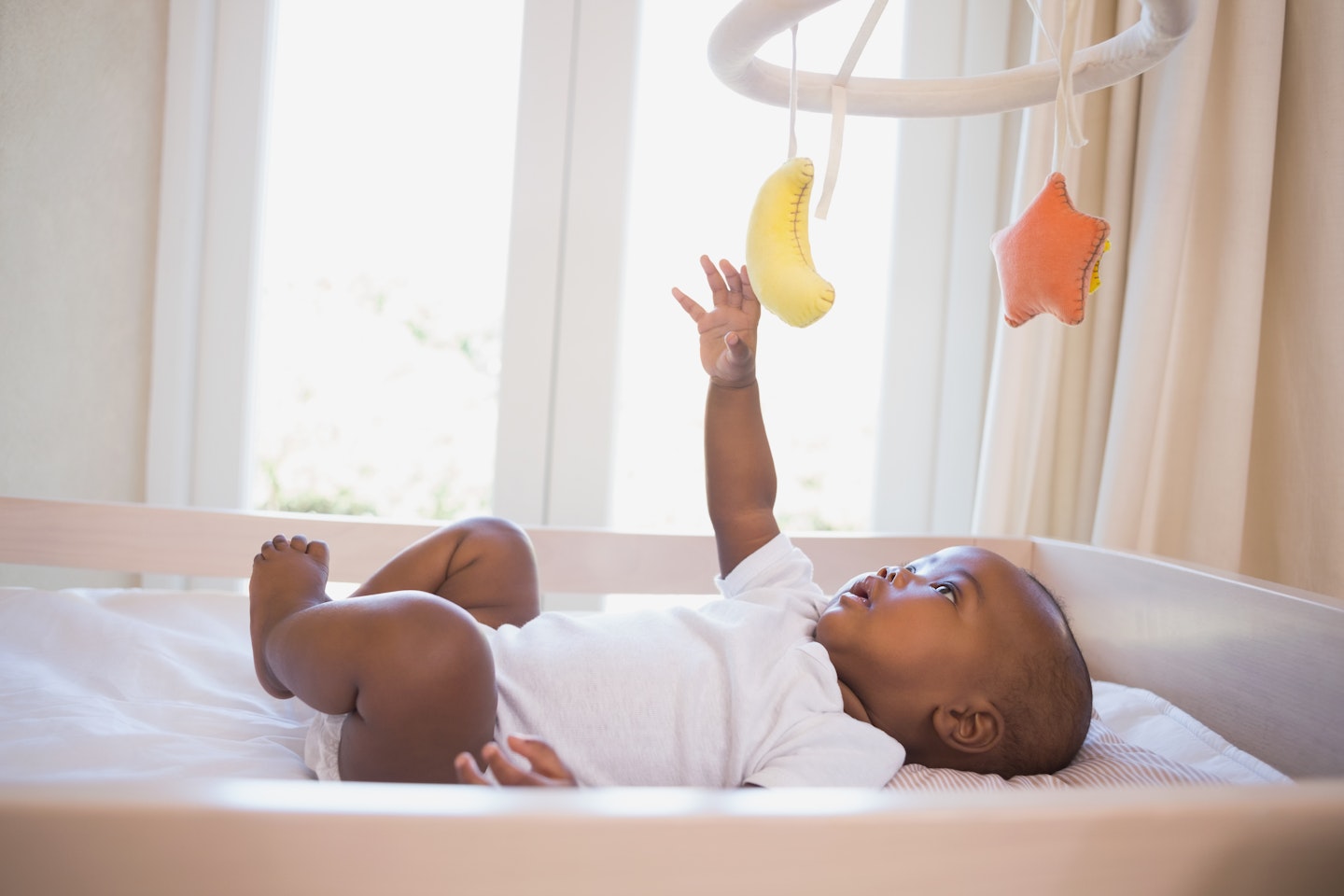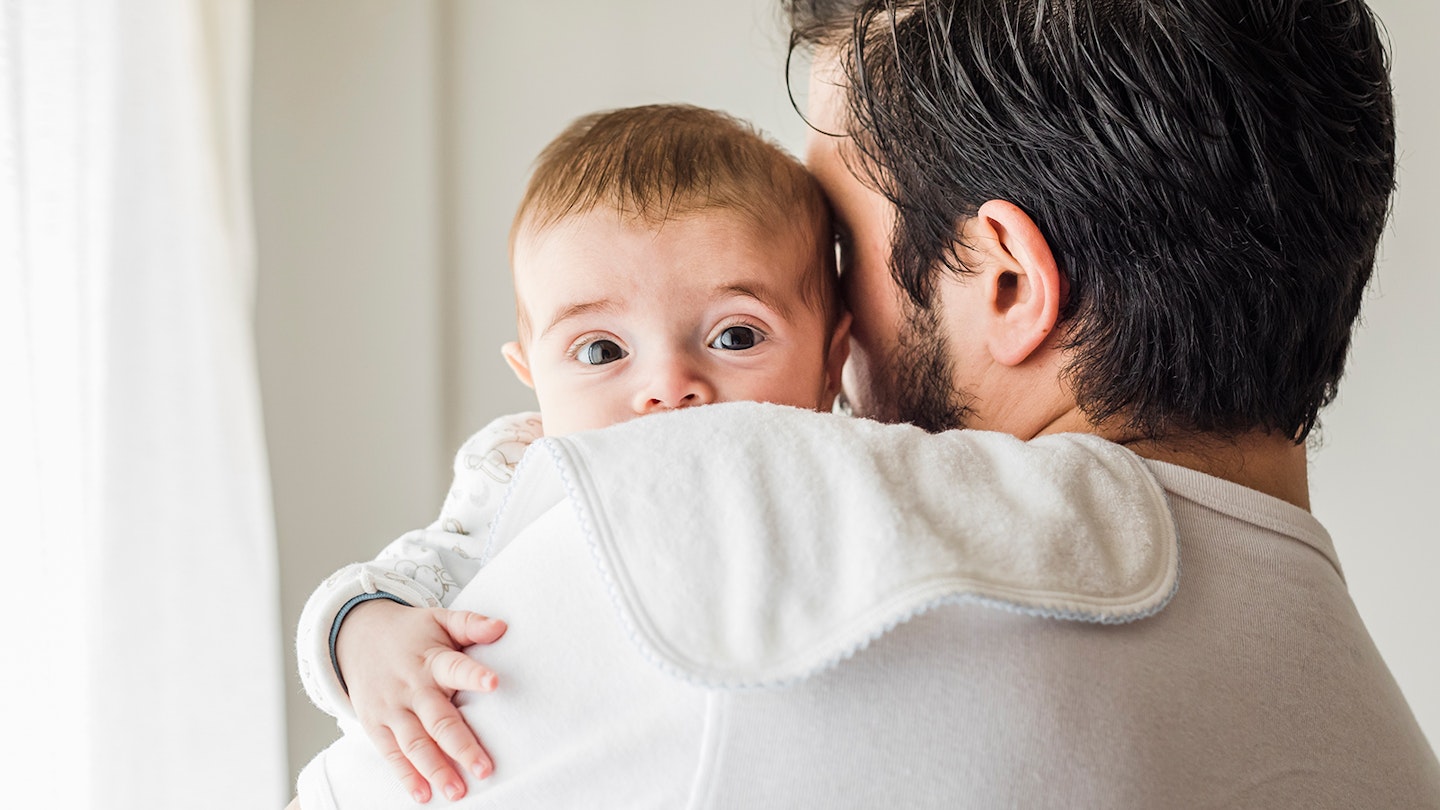Medically reviewed by baby sleep consultant Lucy Wolfe.
While you're probably dreaming about the day when your baby sleeps through the night, baby sleep is a constantly shifting (anything from seven days to six weeks) thing. You’re just starting to think you’ve got your baby's sleep schedule all sussed when – pow! – Something comes along and knocks it sideways. It might be a cold or teething, or it might be that your baby is suddenly going through a completely normal sleep regression.
So what exactly is sleep regression, what causes it, how long will it last, and what can we do about it? Get your mug of (strong) coffee ready, because we’ve got all the answers for you below.
What is sleep regression?
'Sleep regression is the name that's given to a period of time - anything from seven days to six weeks - when your baby hits a key developmental milestone, such as learning to walk,’ says baby sleep consultant Lucy Wolfe. ‘He’s figuring out a new skill and he wants to practise. But that messes with his snooze time.’ You’re most likely to experience sleep regressions at certain milestones, and the key to coping with them is understanding what's going on.
What causes sleep regression?

It’s common for babies to experience sleep disruption at any age, but especially around four months old. At this age, your little one may be starting to roll over, so he’s keen to spend his cot time tipping from side to side. He’s also developing depth perception and learning to see the world in all its three-dimensional glory. Just reaching his hand through space, picking up an object and passing it from hand to hand is a mesmerising pastime. ‘These are significant learning points and can impact sleep,’ says Lucy. ‘That’s why four months is often called the first major sleep regression.’
This is also the age when sleep matures. In the first three months of life, your youngster’s snoozing has been regulated by his stomach – he wakes when he’s hungry. At around 16 weeks old, that changes. This is when your baby starts to experience sleep cycles – moving from light sleep into deep sleep and back into a light sleep. ‘Babies' sleep cycles are 40 minutes long,’ says Lucy. ‘And they spend the first 10 minutes of each sleep cycle in light, easily disturbed sleep. At the end of each 40-minute cycle, they’ll wake up. This might be a momentary awakening, or they might fully wake up and need your help to go back to sleep.’
How long does sleep regression last?
All this information is all well and good but there’s one thing parents want to know about sleep regression; how long is this going to last? We don’t want to scare you, but sleep regression is a popular time for babies to pick up some hard-to-break habits, meaning that this could last a long time — but, if you take the right steps, your child could be sleeping again without any problems within just a few weeks.
Sleep regression signs
If you can’t tell whether your child is having sleep regression or not, then they’re probably not, because if they’re going through it, so are you.
Sleep regression symptoms include:
• Waking up in the middle of the night and not wanting to go back to sleep again
• Their once two-hour afternoon naps are becoming 20-minute power naps
• General restlessness
• Being wide awake when they would otherwise be snoring their little heads off
• A change in appetite
• Fussiness
• Out-of-character whinging
When can sleep regression happen?
Baby sleep regression can happen at any stage of your baby's first year, and while some factors can affect baby sleep, such as an illness or a disruption to their routine, it's likely their sleep will be disturbed at certain stages when they're having growth spurts, reaching new milestones and teething.
4-month sleep regression
The dreaded four-month sleep regression. This is the stage most parents find their baby's sleep changes for the first time since being born. This change is normally down to teething, growth spurts and the excitement of learning how to roll over for the first time.
6-month sleep regression
Your baby will be going through another growth spurt at this stage, but they'll be much better when it comes to sleeping through the night. If they regularly wake for some cuddles during the night, it might be a good time to start trying out a sleep training method.
8-month sleep regression
As your baby learns to crawl and move around by themselves, you may find their sleep is disturbed. Separation anxiety is also normal for babies at this stage, which may cause your baby to wake up in the night.
12-month sleep regression
Babies can usually stand up by this point and some have even taken their first steps. These huge milestones can cause some temporary sleep problems, but they shouldn't stick around.
Toddlers
At the 18-24 month mark, you may find your toddler's sleep is disturbed and that you experience toddler sleep regression. This is normally down to things like nightmares, toddler teething, fear of the dark and also separation anxiety. Find out more about toddler sleep here.
Different kinds of sleep regression

Stand-up sleep regression
‘At around nine months, your baby hits two developmental milestones that can affect his sleep,’ says Lucy. ‘The first is that he becomes strong and coordinated enough to begin pulling himself into a standing position.’ So, instead of chilling out for naps during the day or a good night’s sleep, your baby starts using his cot time to wobble upright. This is a skill he needs to practise, so give him lots of ‘awake time’ to work on it, either in the cot or with the help of other stable furniture such as a sofa. ‘Show him how to sit back down once he’s standing up,’ says Lucy. ‘Babies often get stuck in the “up” position because they don’t know how to bend their knees and go back down safely.’
The second nine-month milestone is that he becomes more aware of the world and how reliant he is upon you. That can make him feel anxious when you’re not there. ‘This separation anxiety can trigger a sleep regression because your baby won’t want you to leave him when it’s time for bed,’ says Lucy. Try to give him more time with you during the day, so that it’s easier for him to separate at night. Play lots of games together, particularly ones like peek-a-boo that reinforce the idea of going away and coming back again.’
Walking sleep regression
At around 12 months, babies often start walking, which can lead to difficulties in going to sleep and issues with your youngster waking up restless in the middle of the night. ‘Baby-proof your home and give your baby the freedom to move about, rather than being stuck in a playpen,’ says Lucy. ‘And get out and about in the fresh air. Set about trying to use up all that excess energy through activity.’
During his bedtime routine, put your baby in an age- and temperature-appropriate sleeping bag, as these tend to be snug, making your baby less inclined to stand up. ‘If he is still clambering to his feet, let him do the practice he feels he needs to do,’ says Lucy. ‘But make sure the cot is at its lowest level so he can’t climb out. Sit on the floor next to him, to encourage him to lie back down and be closer to you.’
Another common issue around 12 months is that babies learn about cause-and-effect. ‘They start testing things to see what the result will be,’ says Lucy. ‘What will happen if I refuse to go into my cot? What will happen if I throw my comforter onto the floor?’ While this can be annoying, try not to let it show.
‘When parents react to a particular behaviour, babies keep repeating it,’ says Lucy. ‘The best way to handle this is to pay attention to positive behaviour and to stay calm when he’s doing something you don’t want him to do.’
Talking sleep regression
Toddler sleep can also be affected by sleep regression, and this is usually due to talking. ‘Of all sleep regressions, this one is often the least disruptive,’ says Lucy. ‘That’s because instead of thumping about in his cot, you’re most likely to hear him chatting to himself.’ The early hours are a common time for youngsters to wake up and practise their talking or singing. ‘He’s slept deeply in the earlier part of the night and is now sleeping more lightly,’ says Lucy. ‘Plus, his brain is on high alert, which makes him more likely to wake up as a result of environmental changes such as the room getting colder or lighter.’ Try to make sure that your toddler’s room is at a comfortable temperature (between 16-20°C) and that you’re using a good blackout blind to keep it dark. Chat and sing with him during the day, and if he’s up a lot in the night, think about bringing his bedtime forward to compensate.
‘The two-year-old sleep regression may also see your toddler going on a nap strike,’ says Lucy. ‘This is a period of about two weeks during which he’ll refuse to have his daytime nap.’ Don’t be fooled into thinking he’s ready to drop his daily daytime snooze forever. All he wants is more awake time to practise his chat. Keep offering the nap – and give him quiet time if he won’t sleep – and, after about a fortnight, nap-time will come back!

Solutions and tips for sleep regression:
1. Understand what's going on with your little one, so that you don’t get stressed.
2. Work out the skill that your baby is developing and give him lots of time to practise it during the day.
3. Do whatever you can to stop your baby from getting overtired. ‘A sleep regression may only last for a week, but if your baby becomes overtired, his sleeping patterns can be disrupted for much longer,’ says Lucy. ‘You don’t want to go back to rocking or feeding your baby to sleep during a sleep regression because that will cause problems further down the road. But if your baby is struggling to fall asleep, you could try driving him around in the car, pushing him in the buggy, or carrying him in a sling until he starts to sleep. If you keep your baby’s sleep tank full while he goes through his developmental milestone, he’ll find it much easier to get back on track once he’s mastered the new skill.’

Sleep regression doesn’t last forever, and with some time and patience (and did we mention coffee?), you can get through this; it’ll be nothing but a memory in no time.
About the expert
Lucy Wolfe is a Sleep Consultant, Co-Creational Relationship Mentor, and Post-Graduate Researcher (PhD). A mum of four, she is the bestselling author of The Baby Sleep Solution and All About Baby Sleep – Your Questions Answered. Lucy is also the creator of the 100% natural Sleep Through Bed and Body Sleep Spray and Relaxing Rub brand.
About the author
Kat de Naoum is a freelance writer based in the UK and Greece. She has written for many publications, and, as an advocate for female empowerment, loves to write about women’s issues, and helping fellow mothers feel supported and less alone.
